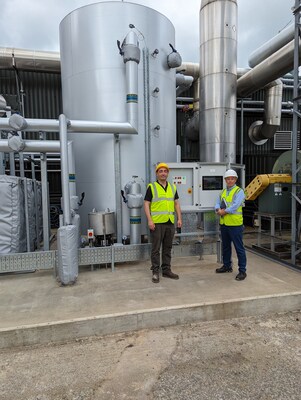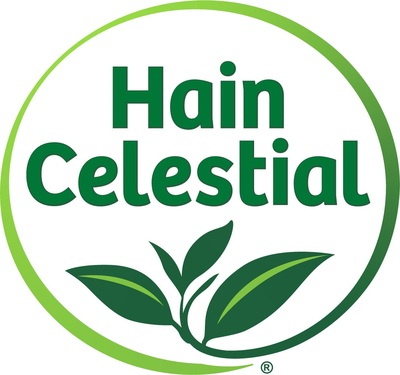Hain Celestial Powers Towards a Healthier Planet by Generating Electricity from Fruit
The Hain Celestial Group (NASDAQ: HAIN) has invested in decarbonization technologies at its largest UK manufacturing site in Histon, Cambridgeshire. The initiative involves upgrading the anaerobic digestion (AD) plant to convert fruit waste into biogas, generating 25% of the facility's energy needs on-site. This project aligns with Hain's goal to reduce greenhouse gas emissions by 42% globally by 2030 and supports its commitment to renewable energy and waste diversion. The enhanced AD plant will more than double the energy produced from waste fruit. Hain Celestial aims for 100% renewable energy use and 90% food waste diversion by 2025.
- Investment in decarbonization at Histon enhances sustainability.
- New AD plant generates 25% of facility's energy needs from fruit waste.
- Supports Hain's goal to cut GHG emissions by 42% globally by 2030.
- Targets 100% renewable energy use and 90% food waste diversion by 2025.
- None.
Insights
Hain Celestial's investment in decarbonization technologies at its Histon facility is a prime example of how companies can leverage innovative solutions to meet sustainability goals. Anaerobic digestion (AD) is a process that breaks down organic material in an oxygen-free environment to produce biogas, which can then be used to generate electricity. The implementation of this system, combined with a combined heat and power (CHP) unit, showcases a 'closed loop' energy system where waste is converted back into usable resources.
This project aligns with the company's goal to reduce Scope 1 and 2 emissions by 42% by 2030. Such substantial reductions require innovative and efficient technologies and the AD system is a solid step toward these targets. Moreover, generating
For retail investors, this commitment to sustainability can enhance Hain Celestial's brand reputation, attract eco-conscious consumers and potentially reduce long-term operational costs. However, the success of such initiatives depends on continuous performance and scalability across other facilities. A close eye on the actual energy savings and emission reductions achieved will be important in assessing the long-term impact of these investments.
The financial implications of Hain Celestial's investment in decarbonization technologies are noteworthy. A significant part of modern ESG (Environmental, Social and Governance) investing focuses on companies that are actively reducing their carbon footprint. By investing in an AD plant to convert fruit waste into energy, Hain Celestial is not only cutting down on waste and emissions but also potentially lowering its long-term energy costs.
Investing in such technologies often comes with substantial upfront costs, yet the potential for operational cost reduction through on-site energy generation can lead to improved margins in the long run. This initiative could also lead to additional streams of revenue if excess energy is sold back to the grid or if there are incentives for renewable energy production.
Retail investors should consider the initial capital expenditure against the anticipated savings and revenue. Additionally, Hain's alignment with the Science Based Targets Initiative (SBTI) adds credibility and transparency to their sustainability goals, which can be favorable in attracting long-term investments.
Investments in decarbonization technologies at company's largest
Histon is the production site of many of Hain's most popular brands, including Hartley's® jams and jellies, Robertson's®, Frank Cooper's®, and Rose's® marmalades, as well as Clarks® maple syrup.
The investments at Histon include a major upgrade of the anaerobic digestion (AD) plant at the site, which processes fruit waste to create biogas. This in turn is used to generate electricity through an efficient combined heat and power (CHP) unit, with the heat used to produce hot water for use on site – creating an efficient 'closed loop' energy system with fruit at its core.
The new AD plant will more than double the energy being produced from waste fruit. This will take the total green energy generated onsite to
"We're incredibly proud of the work that's been done at Histon," said Benjamin Jeffery, Sustainability Lead at Hain Celestial. "After seeing the initial positive results and improvements, we are delighted to be installing a second combined heat and power (CHP) system to generate even more sustainably sourced electricity on-site."
Histon, which is also ISO 14001 certified, is a model for Hain's ambitious approach to creating a Healthier Planet and will inspire other decarbonization activity across the global portfolio. The group has set clear goals aligned with the Science Based Targets Initiative (SBTI) to cut Scope 1 and 2 emissions by
The group is also targeting
"Histon represents a significant step forward in our commitment to reduce our environmental impact and enhance sustainability across our global operations," said Chris Jenkins, Global Head of Impact at Hain Celestial. "Our investment in decarbonization technologies, including anaerobic digestion, serves as a prime example of our commitment to environmentally sound business practices as we leverage innovative solutions to help power a healthier planet and healthier people."
About Hain Celestial
Hain Celestial Group is a leading health and wellness company whose purpose is to inspire healthier living for people, communities and the planet through better-for-you brands. For more than 30 years, our portfolio of beloved brands has intentionally focused on delivering nutrition and well-being that positively impacts today and tomorrow. Headquartered in
Our leading brands include Garden Veggie™ snacks, Terra® chips, Garden of Eatin'® snacks, Earth's Best® and Ella's Kitchen® baby and kids foods, Celestial Seasonings® teas, Joya® and Natumi® plant-based beverages, Greek Gods® yogurt, Cully & Sully®, Imagine® and New Covent Garden® soups, Yves® and Linda McCartney's® (under license) meat-free, and Alba Botanica® natural sun care, among others. For more information, visit hain.com and LinkedIn.
![]() View original content to download multimedia:https://www.prnewswire.com/news-releases/hain-celestial-powers-towards-a-healthier-planet-by-generating-electricity-from-fruit-302186895.html
View original content to download multimedia:https://www.prnewswire.com/news-releases/hain-celestial-powers-towards-a-healthier-planet-by-generating-electricity-from-fruit-302186895.html
SOURCE The Hain Celestial Group









